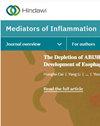铜臭相关基因DLD的泛癌分析
IF 4.4
3区 医学
Q2 CELL BIOLOGY
引用次数: 0
摘要
背景。癌症每年影响数百万人,并在全世界造成巨大的经济和社会负担。铜细胞死亡是最近发现的一种新的细胞死亡方式。铜腐病相关基因二氢脂酰胺脱氢酶(DLD)的确切功能及其在泛癌中的作用尚不清楚。方法。数据从GTEx, TCGA和多个在线网站检索。这些数据被用来评估DLD在各种肿瘤中的表达、预后和诊断价值。通过相关分析探讨DLD与免疫微环境免疫调节剂、免疫检查点、肿瘤突变负荷(TMB)、微卫星不稳定性(MSI)、肿瘤药物敏感性的关系。结果。DLD的mRNA和蛋白表达在大多数癌症中是不同的。生存分析显示,DLD与KIRC、KIRP、KICH和UCS的预后相关。DLD对KIRC、GBM、PAAD和LGG有较强的诊断价值(AUC > 0.9)。DLD启动子甲基化影响LIHC、LUSC、PAAD、READ和THCA的异常表达。DLD与UCEC、TGCT、LUSC和SARC的基质评分、免疫评分和ESTIMATE评分呈负相关。在UCS中,静息记忆CD4 T细胞和活化NK细胞与DLD表达显著相关。在各种癌症中,DLD表达与免疫调节剂、免疫检查点、TMB和MSI之间也存在显著相关性。重要的是,我们还确定了一些可能针对DLD的潜在药物。结论。DLD表达与多种肿瘤预后相关,在肿瘤发生、肿瘤代谢和免疫中起着不可或缺的作用。本文章由计算机程序翻译,如有差异,请以英文原文为准。
Pan-Cancer Analysis of the Cuproptosis-Related Gene DLD
Background. Cancer affects millions of people each year and imposes a huge economic and social burden worldwide. Cuproptosis is a recently discovered novel mode of cell death. The exact function of the cuproptosis-related gene dihydrolipoamide dehydrogenase (DLD) and its role in pan-cancer is unknown. Methods. Data were retrieved from the GTEx, TCGA, and multiple online websites. These data were used to assess the expression, prognosis, and diagnostic value of DLD in various tumors. The relationship of DLD with immune microenvironment immunomodulators, immune checkpoints, tumor mutational load (TMB), microsatellite instability (MSI), and oncology drug sensitivity was explored by correlation analysis. Results. The mRNA and protein expression of DLD differs in most cancers. Survival analysis showed that DLD was associated with prognosis with KIRC, KIRP, KICH, and UCS. DLD had a strong diagnostic value in KIRC, GBM, PAAD, and LGG (AUC > 0.9). DLD promoter methylation affects the aberrant expression of LIHC, LUSC, PAAD, READ, and THCA. DLD was negatively correlated with stromal score, immune score, and ESTIMATE score in UCEC, TGCT, LUSC, and SARC. In UCS, resting memory CD4 T cells and activated NK cells were significantly correlated with DLD expression. Significant correlations were also observed between DLD expression and immunomodulators, immune checkpoints, TMB, and MSI in various cancers. Importantly, we also identified a number of potential drugs that may target DLD. Conclusion. DLD expression is associated with a variety of tumor prognoses and plays an integral role in tumorigenesis, tumor metabolism, and immunity.
求助全文
通过发布文献求助,成功后即可免费获取论文全文。
去求助
来源期刊

Mediators of Inflammation
医学-免疫学
CiteScore
8.70
自引率
0.00%
发文量
202
审稿时长
4 months
期刊介绍:
Mediators of Inflammation is a peer-reviewed, Open Access journal that publishes original research and review articles on all types of inflammatory mediators, including cytokines, histamine, bradykinin, prostaglandins, leukotrienes, PAF, biological response modifiers and the family of cell adhesion-promoting molecules.
 求助内容:
求助内容: 应助结果提醒方式:
应助结果提醒方式:


